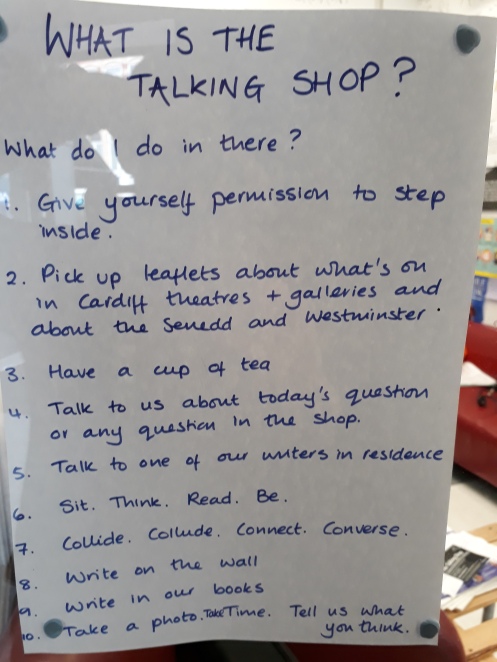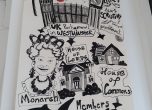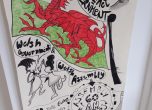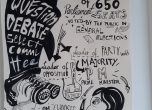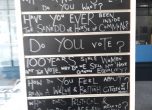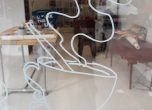Production Description
The Omidaze Production’s Talking Shop pilot took place between March 25 and April 20 2019 in 33 High Street Arcade Cardiff and was an Omidaze Productions R&D project made possible through the support of National Theatre Wales with additional support from Dirty Protest, Creative Cardiff and The National Assembly of Wales.
“Evocative and inspiring to a level I could not imagine.”
The Talking Shop pilot was a month long conversation with the public in Cardiff City Centre.
“Just wanted to send you a message after Thursday’s Talking Shop event, to say how important I think your work is. I know the Talking Shop has all sorts of amazing benefits but the key on for me is the social side of things – not only finding people through networking which allows us to take steps toward leading the life we want, as well as helping others do the same – but also just simply finding people to talk to… There’s such a feeling of importance to this whole project. I hope something can come out of it.”
Lucy – Talking Shop Visitor and Rehearsed Readings Audience Member
The Idea
“Love this space. Very Welcoming and Open”
The Talking Shop is a Cultural and Political Information & Creation Centre – a public R&D space which encourages and promotes cultural and political engagement.
The Talking Shop – A Cultural Information Centre
In The Talking Shop you can find out things. What’s on in theatres and performance spaces in Cardiff and beyond? What shows are on in galleries, what exhibitions are happening, concerts and workshops? You can find out about creative learning and participation projects and how to book an artist to deliver work in your school or business. It is a physical listings hub. A place to drop in and find stuff out. To add to. To be part of. It is a physical ‘What’s On’ Space. It is a one-stop shop which everyone helped curate.
“How lovely, a place to re-connect, share, brew ideas, troubleshoot and learn. Generous and informative – much needed. Will be back soon!”
The Talking Shop – A Political Information Centre
It is also a place to find out about and understand our political structures and systems. It has no political bias or party affiliation. Our political systems and structures are explained. The difference, for example, between local elections and general elections. You can pick up leaflets and information about the engagement team at the Welsh Assembly or book a workshop to come to your school. You can find out about our parliaments, how to start a petition and who holds the power. Who to speak to about what. Access, Engagement and Social Justice are key.
“A lack of communication is bad for communities. Interaction in politics is vital for young people. Da iawn. Love it here. “Talking Shop Visitor
The Talking Shop – A Creative Centre
Collide. Connect. Collude. Create. Debate.
The Talking Shop is for artists, creatives and the public to get together, share ideas, collaborate. It is a new way of working. We invite people to just pop in and sit on the sofa. Have a cup of tea and be inspired, challenged, informed.
“Truly the best way to spend a Saturday. I cannot remember the last time I learnt this much or was with a varying amount of different professionals – Artists, Historians, Children’s Writers, Actors, Lecturers, Students. Without conversations we are nothing.” Talking Shop Visitor Jonathan Rowland
We invited artists and creatives and members of the public to just drop in and meet each other. To share information, ask questions, discuss. We positioned questions around the shop and invited the public to discuss a new question each day. We invited people to step inside. To think about this. Together.
Because as an old Japanese proverb says “None of us are as smart as all of us”
“What a great place for artists and non-artists to share the space for ideas and discussion. Love the vibe of just dropping in and having a chat over a cuppa. Hope you grow further. Every town needs such a space”
Inside the pilot version Omidaze were researching and developing two things. Omidaze’s next production(s) and the concept of The Talking Shop itself.
To do both these things we knew we had to seek out voices which are currently under-represented in our theatres, our live performances and our audiences. We decided to listen carefully to what excites, angers, engages and inspires people in Wales and Britain today. We wanted to hear people’s views and thoughts on politics, culture and society. Those views and opinions have helped to form three writers’ responses to The Talking Shop.
The Talking Shop is a space for the public and artists to talk, and for artists to create in response. The Talking Shop encourages and facilitates public engagement with arts and culture, and political systems and structures. It is a public space in which to articulate, champion and strengthen the role of culture and democracy in society and empower through a sharing of information and knowledge.
The Talking Shop invites all artists & creatives and the public to use the space to work, to think, to talk, to find stuff out, to share, to be. Together.
“I came here not knowing what to expect but I’ve met some lovely new people from different places and cultures and walks of life. It’s a positive vibe to come to a place and actively engage with people- chat, have an open mind and share some food….it feels like a good example of opening your door and people will come and engage on their own terms. Diverse Cardiff.”
We are living in turbulent and uncertain political times.
We know that we want to focus on political and cultural engagement.
We knew that we needed to not be behind closed doors to develop our next piece of theatre. We also thought the Talking Shop was a concept that might be needed and wanted and we decided to test that theory. We wanted and needed to get outside our bubble and talk and listen to people who did not look and sound like us and who had different views to our own to find out the answers.
We knew we needed to stop doing the talking and listen. Really listen. And perhaps have some difficult conversations.
And we did.
And now we would like to share with you what we might like to do next.
“This in genuinely inspirational – mind opening. Society cohesion. Meeting others and learning different viewpoints. Getting challenged/educated. Thanks. I can grow as a person. Focussing on important issues. Free Conversation. This is an amazing idea. Thanks for starting this. I really appreciate this.” Talking Shop Visitor
The Talking Shop writers in residence were
Tracy Harris, Kyle Lima and Dick Johns
All writers received dramaturgical support from our partners National Theatre Wales and Dirty Protest.
A sample of their work which was written in response to their week long residencies in The Talking Shop, was presented as Public Rehearsed Readings on June 20th in Cardiff.
“One of the performed pieces from the writers’ work on Thursday really filled me with hope. It was the one about loneliness. I’ve always thought acknowledging loneliness and talking about it can really help to crush it, and it was overwhelming to sit in a room of people acknowledging the feeling. I really loved the piece. “
Rehearsed Readings Audience Member
We are currently developing Kyle Lima’s piece with National Theatre Wales and separately developing Dick Johns script., which is now in its third draft.
This full Talking Shop report which you can read here is about what Omidaze Productions, led by Yvonne Murphy, found out during The Talking Shop Pilot and explains why we believe there is an identified need for a permanent Talking Shop in Cardiff City Centre and possibly beyond.
The Talking Shop pilot received over 550 visitors aged from two to ninety-two, reaching across all social, ethnic and economic backgrounds. A strong and urgent need to have a ‘shop window’ for arts and culture combined with public information on our political and democratic systems and structures in the very heart of our capital city was identified.
“What an intriguing concept. An idea whose time has come”
All quotes in bold are taken from the Talking Shop Visitor books unless otherwise accredited. Each quote is from a different visitor.

Identified Needs:
Which I would argue are all needs which all of our cultural buildings should be meeting every single day
- A dedicated public space for artists and creatives to meet the public and each other. To share and test ideas and concepts
- A dedicated physical cultural information centre. A physical What’s On/listings hub
- A physical information point for our democratic services, systems and processes allowing a fuller and deeper understanding of Local, Welsh and UK Government and thereby facilitating wider public engagement and more inclusive approach to democracy
- A public forum for democratic discourse and debate
- A space for artists and creatives to share their intellectual and physical resources and work in a smarter and more collective and collaborative fashion
- A joining up of the Creative Industries/Arts wide ecology and industry entry points
- A physical knowledge bank for the arts and Creative Industries where information, skills, knowledge and experience can be shared and promoted
- A physical, open, inclusive, welcoming and non-commercial space in the centre of the city for all arts, cultural & creative industries to celebrate with the public the importance and value of arts and culture for us all in society.
“Good Idea. Needs to be here full time”
The potential Return on Investment of a permanent Talking Shop, both in actual monetary terms and in social and cultural value is immeasurable. Investment in Arts and Culture has long been proven to be one of the most cost effective and successful and long term impact approaches to urban and economic redevelopment.
The impact of The Talking Shop Pilot on health, well-being, loneliness and social isolation, rehabilitation, reintegration and Cardiff’s homeless community was overwhelming in the short time it was open.
A permanent Talking Shop (or properly functioning cultural organisations) will therefore positively impact
- Health,
- Well-being
- Loneliness & Social Isolation
- Rehabilitation
- Reintegration
- Social services
- Cardiff’s homeless crisis
- Economics
- Social Empathy
- Cultural Capital & Value
- Local Artists and Creatives & the wider Creative Industry and ecology
- Cardiff and Wales’ Soft Power, Reputation and Brand
There is a clear and urgent need for all the things The Talking Shop offered during its short existence. The question is why? Why do we need a permanent Talking Shop? Why now and why are these needs not already being met?
Where are our forums for debate and conversation? Where are the spaces where people can go for cultural and political information and collide, connect, collude, create and debate with people from different walks of life? Where can strangers meet and discuss big questions about life, art and politics? This came up time and time again in The Talking Shop. Why did people need and want the Talking Shop so much? What had we lost? Why were we being so overwhelmed by the response to what we had created? People named the pub and religious institutions as the lost forums along with social clubs and working men’s clubs attached to working class centres of employment.
“My vision has been fed by this space. To kindly engage in social, political and environmental debate.” Josephine Green Talking Shop Visitor
The pub was once the stronghold of political and cultural discourse. However pubs are dying out like the high street. Economics and Health concerns have driven people away from the public houses. Similarly the patronage of traditional working men’s clubs and work affiliated social clubs has declined in accordance with the destruction and demise of many working class centres of employment. The modern factory – the call centre – does not have the same community feel and alcohol related loyalty surrounding it. This is not necessarily a bad thing. Alcohol was never a good mixer with calm and rational debate, good listening skills and balanced judgement. Alcohol would also prohibit the conversation from being inclusive to all. However the loss of the pub and club is felt and grieved nonetheless.
“I love this space. Everyone is so friendly and engaging”
Another main forum used to be provided by religious establishments. The chapel, the church, the church hall, the synagogue, the temple or mosque and in many places and for many people this continues to be the case. However for many religion has ceased to offer a place and a meaning. Like alcohol, religion can sometimes be problematic when it comes to calm and rational debate, good listening skills, open-mindedness and inclusivity. The retail location has become the new place of worship on a Saturday and Sunday for many. There has been no replacement for the lost sense of community, belonging, and forum for strangers to come together under one roof and share a common purpose.
And yet surely this is what our cultural institutions are for? We asked this over and over again in The Talking Shop? Why do we need a Talking Shop when we have theatres, Arts Centres, Libraries, Museums, Concert Halls? Why can we not gather there?
The answers came fast and furious each time we asked.
- I would never go up to a stranger in the café of an arts centre and start a conversation
- They are all too busy trying to survive and to survive they have to sell you stuff
- I don’t feel welcome in them. No one looks like me
- The Talking Shop would get lost in there
- Each one is a brand. One vision. The Talking Shop is open to all and to all ideas
- The library is too quiet
- You have to buy something to sit down
Now Omidaze has a vision where all cultural institutions are welcoming and inclusive. Where all individuals in society feel and know that those publicly funded buildings belong to them, their families and friends. That they are theirs. That no money needs to exchange hands. That the young and the old and everything in between feel welcome to walk in, sit down and own the space. To collide, connect and collude with artists on a daily basis. We know there are libraries which are already busy bustling buildings bursting with creative energy and arts centres full of people welcomed individually and actively brought together. However we also know from our own previous research and from speaking to over 550 visitors to The Talking Shop that many will not cross the threshold of our existing cultural institutions. That they do not feel that they belong or that they are relevant to them and theirs. We also know some things which will encourage the general public and non-traditional arts attendees to engage. If the venue is in the centre of the shops. If it is visible. If it is genuinely open to all. Non-judgemental. Welcoming. If it asks questions. If it shares the power. And is clearly not trying to sell you anything. If there is a host to greet you as you enter and introduce you to the space, its aims and its opportunities it offers and to put you at your ease. Oh and if you can get a cup of tea.
“Great to have a friendly venue where anyone can talk/meet. Great idea. Would be good to have more of these.”
This report examines what The Talking Shop aimed to do, who came and what we learnt and invites you to imagine, as you read this report, the potential impact of a permanent and properly funded Talking Shop in our City Centre.

Those shop windows already exist. They are our cultural buildings. And yet they are not doing what they should. If they were there would have been no need to make a Talking Shop. When the pandemic hit I was in the process of securing funding to open a Talking Shop for a full year in the centre of Cardiff. Arts Council Wales had agreed to anchor fund it and we were in conversation with Creative Cardiff and I was about to meet the leader of Cardiff Council re match funding. I knew all along that we shouldn’t need a permanent Talking Shop as I write in the report. It was a provocation. My dream then and now is that every cultural building is a Talking Shop.
There has now been a chorus of voices calling for us to rethink, reform, reshape our cultural sector in response to the Covid19 Global Pandemic. I am sharing this in the hope that it may help. Much has been written, talked and thought about since March 2020. It is both complex and very simple simultaneously. Here is the simple bit.
- Open your doors. Actually physically open them and prop them open even when it is bloody freezing. Keep your doors open. I have worked in the sector for 30 years and still find it hard to walk through some doors. Even into buildings where I have worked. I can not overplay the importance of this. And do not lock any of your doors. If you try a locked door you may never bother to find the open one or ever come back. I heard in a zoom room recently about a theatre which has three main front doors. Two of which are always locked. You only know which one is the open one if you work there. I have tried to get into theatres through the beautiful front door only to find it locked, feel embarrassed and stupid and then have to work out how to get in though a weird side door or given up and left. Spend less money on marketing. Open your doors. Literally and metaphorically.
- Put signs up. Not too many cos that is scary too but just one which says ‘come in’ or ‘welcome’. The two we had which most people commented on and said brought them in were ‘Free Tea‘ (see number 4) and ‘We are not selling anything. Ideas and Conversation are free‘.
- Create a welcomer role. Rotate it between your staff so that there is always someone near the door to welcome people in. Your staff should be meeting the people who walk through the door. Every single day. Explain what you do. Introduce people to the building, what it contains, it’s vision, mission and values and introduce them to other people. Connect artists with the public. No more closed doors remember. TELL people they are welcome. Give them permission to enter, to stay to just be. Explain to them that the space is theirs. It belongs to them. Their taxes pay for it so it is theirs to just be in. To sit. To Think. To talk. To read. To watch. Tell young people they can use this building to do their homework, meet their friends, shelter from the rain. Tell people they do not have to spend money to be here. They can stay as long as they like. And keep telling them. And tell them to tell their friends that every one is welcome in this building.
- Give people a cup of tea. FOR FREE. Have free tea on tap all day long. It is the cheapest thing you can do. It will not harm your cafe profits. It will increase them. People will still pay for overpriced fancy coffee and posh pricey cakes. But those who cant. They will feel welcome, watered and wanted. GIVE PEOPLE A CUP OF TEA! and then talk to them. It’s that simple. There is more complex stuff. But we can think and talk about all that over a cup of tea.
- Start a Conversation. Inside the building and outside. Don’t send a digital survey or an email. Switch your computer off and go and sit in the foyer and ask people open questions then shut up and listen to the answer. Really listen and then ask them to tell you more about that. Spend a minimum of one hour of every day in the public part of your building in conversation with people. Not in meetings. Random open conversations. Then go further than the front door. Into the city or town centre. Take some actors in costume or some objects from your collection. In 2013 I took actors onto the streets of Cardiff for two days. We asked people if they went to the theatre. What enticed them or what stopped them. Their answers helped me work out where and how to make that show and confirmed my worst fears. The majority could only name one theatre in Cardiff if they could name one at all and the majority of people we spoke to had not been inside it. The main barriers were – cost, unknown quality, times of performance, shortness of run, uncomfortable & restrictive seating and knowledge of its existence. No one had talked to them about it.
- Get Messy – When I had my first child I apologised to the health visitor about the mess, she said we worry about the homes where nothing is out of place because if you are spending time with your child you will prioritise that and not the housework. I think the same about cultural buildings. If all the staff are busy in the back office and the public spaces are tidy and empty then the very thing which should be your priority is being neglected. Creativity is messy and if your building is not buzzing with the messiness of the full spectrum people in all their beauty and wonder from morning until night then you are failing in your public duty as a publicly funded resource.
If you run a cultural building or organisation of any shape or size in the UK I would ask you to read this report. Every where you read ‘Talking Shop’ throughout the report simply replace with the words ‘cultural building’.
The Talking Shop was created by Yvonne Murphy / Omidaze Productions www.omidaze.co.uk in response to the fracturing of Britain following the 2016 Referendum. After many false starts Yvonne decided to bite the bullet and create a month long pilot version with just £5000 of Research & Development seed funding from National Theatre Wales and donations – £130.76 raised through Just Giving and £27.78 in cash donations inside the shop and an extra £500 from NTW towards paying the actors for the sharing event on June 20 2019. The total of £5,658.54 paid for two writers, a production manager, a filmmaker, insurance, rent, print, materials, travel expenses for a student designer and a very small percentage of Omidaze time. Additional in-kind support came from Creative Cardiff, Dirty Protest, the outreach team of the Welsh Assembly and volunteers from the theatre industry.



